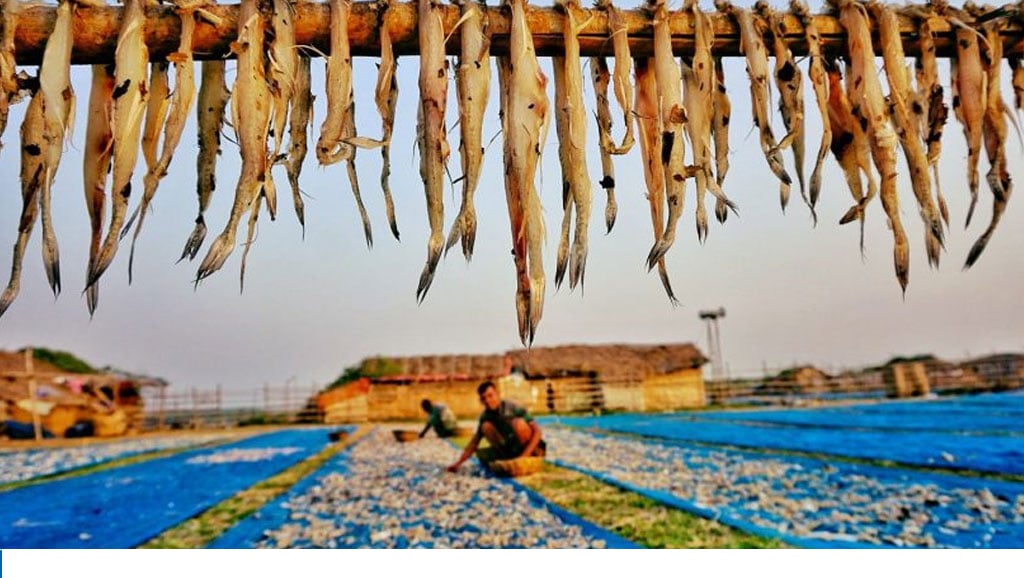News Flash
News Flash

KHULNA, Jan 17, 2025 (BSS)- Like the previous years, fish drying and processing have become vibrant as more than 32,000 fishermen are passing busy days in catching and drying fishes in the Sundarbans for the last couple of months.
The fishermen are drying huge quantities of fishes after catching those from the Bay of Bengal and adjacent rivers of the Sundarbans, largest mangrove forest in the world.
The potential areas in the Sundarbans for dying fish are: Dublarchar, Chapra Khalias, Alorkol, Meher Ali, Majhir Killa, Shewlar Char, Kokilmoni, Kaborkhali, Narkel Baria, Bara Amberia, Manik Khali and Chhoto Amberia.
Azgar Ali, a fisherman of Dublar Char, said: "We go out to net the fishes, which are processed for drying in the sun before sunrise."
He added thousands of fishermen from different areas of the southern region, including Satkhira, Khulna, Pirojpur, Barguna and Bagerhat, built makeshift houses here for drying and processing fishes.
"We will net and dry sea fishes till March 31 here. We found more fish during the new moon and full moon. These dried fishes are being sent to fish traders to different areas including Kuakata, Cox's Bazar and Chattogram," he continued.
Quazi Mohammad Nurul Karim, Divisional Forest Officer, Sundarban East Forest Division, Bagerhat, said there are 13 centres for fish collection, processing and marketing in Dublar Char fish village, about 120 kilometres from Mongla by boat.
Year after year, thousands of fishermen and their hired workforce flock to this vibrant locale, driven by the mission to catch and process an array of sea-fish.
Dublar Char is already bustling with activity as permits for fish harvesting have been issued. It falls under the jurisdiction of Sarankhola range of Sundarbans east forest department.
As the vibrant season unfolds, Dublar Char stands as a dynamic hub, embodying the rich tradition of dried fish processing and coastal camaraderie.
ASM Rasel, District Fisheries Officer, Bagerhat, describes the industrious scene of fishermen constructing temporary shelters, a process taking two to three days for completion. Simultaneously, some fishermen engage in processing their catch under the open sky.
Various fish species, including Loitta, Faissa, Koral, Pomfret, Chhuri, Tuna and more, undergo processing at Dublar Char. The demand for dried fish from this region is particularly high, given the chemical preservative and pesticide free processing methods employed.
Nabibur Rahman, a fisherman from Rampal upazila, shares his experience of a busy day spent crafting makeshift houses with bamboo, polythene, and hogla upon arriving at Dublar Char.
Hundreds of trawlers operate on the island for fishing. There are several workshops with lathe machines there to repair the trawlers. These workshops run on power from generators.
For the fishermen, beautifully-decorated shops have been built around the eastern side of Alorkol in Dublar Char. This bazaar is called "New Market" and it operates six-months of the year in full swing. Despite the seclusion, the prices are reasonable.
Dublar Char is also mostly famous for Rash Mela and sea bathing rituals. Devotees of Hindu religion from Khulna, Bagerhat, Satkhira and Jashore go there each year for religious rites. Weaning ceremonies of many infants also are held on this char.
Over the last four decades, Dublar Char has been known mostly for its fish trade. The village of the fishermen, who catch fish in the ocean, is on Dublar Char now.
The settlement remains on the shoal for six months. Almost 80 per cent of all the dried fish produced in the country comes from this area. No pesticides are used in processing dried fish there.
Hazrat Ali, president of Matsyajibi Samity, mentioned the influx of thousands of fishermen, some already present in the area while others venture into the sea for fishing expeditions.
The peak season of the business ranges between October and March when the sea remains comparatively calm.
Hazrat Ali said dried fish production was going on in full swing at the Aalorkol, Majherkella, Narkelbaria, Shelarchar and Meher Ali Char areas.
Fishermen were seen busy either in laying processed fish on bamboo racks for drying in the sun or taking preparation for their next sailing or returning to the shore with huge catches.
During the season, they collect fish from the sea, sort out the catch according to their varieties and then lay them for drying in the sun.